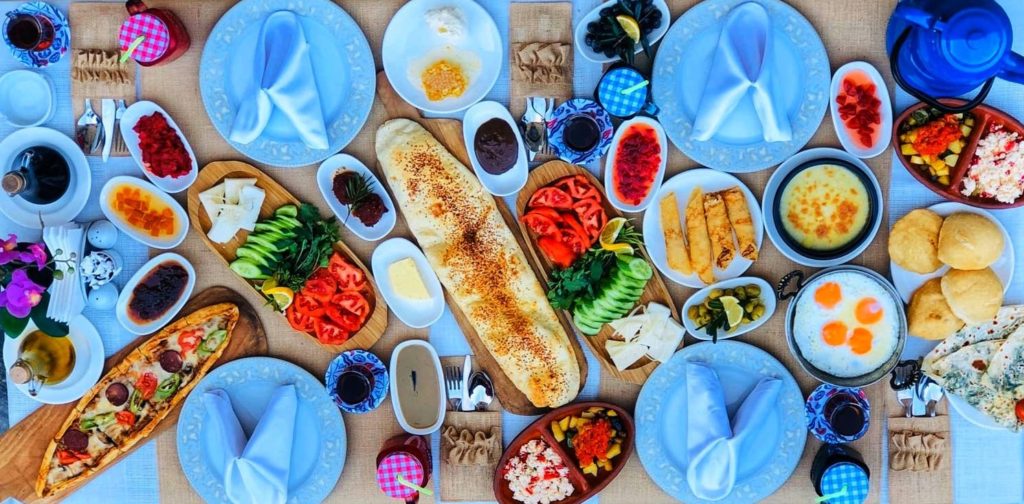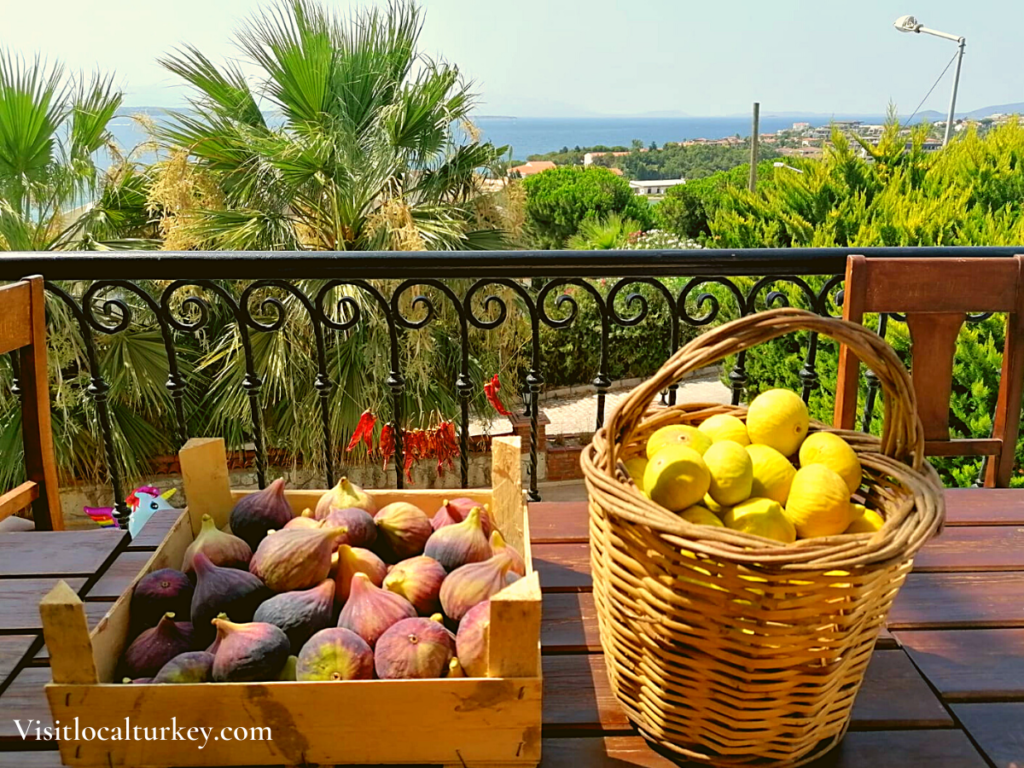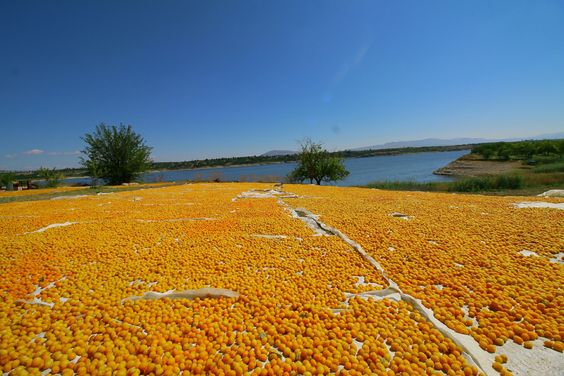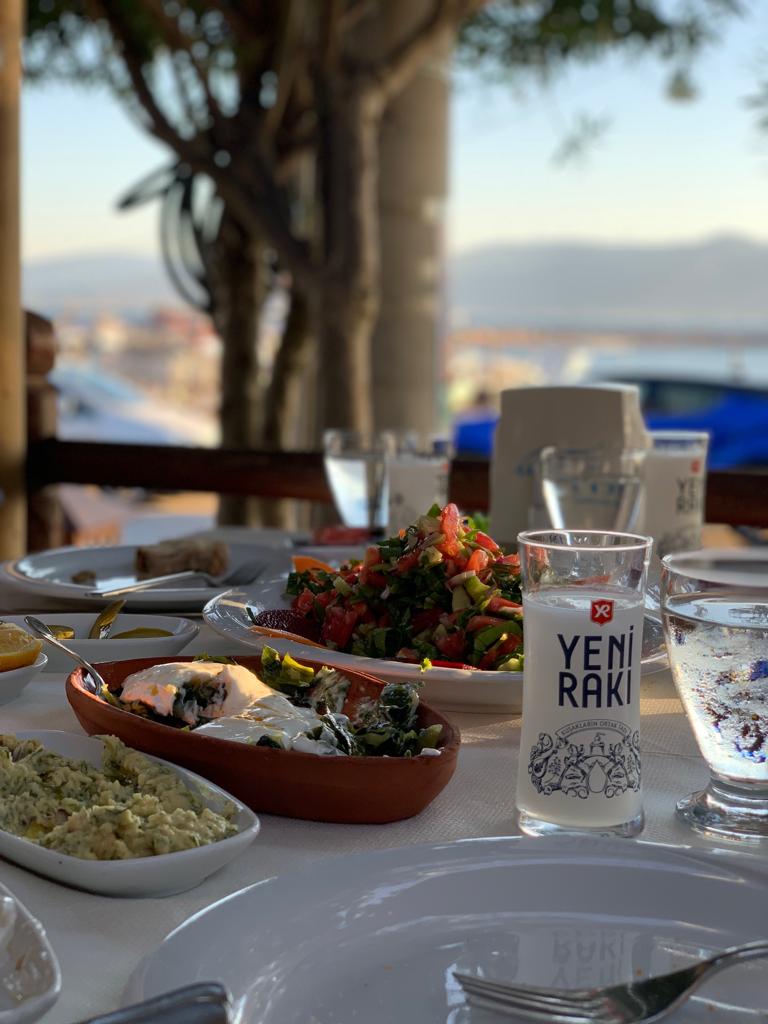Most of my friends coming to Turkey for the first time are curious about what Turkish people eat and what kind of food they will find in Turkey.
Believe me. Food will be the least of your worries. Turkish food is delicious and has many dishes that can please both vegetarians and meat lovers.
In fact, when you return, you will be searching for Turkish food recipes on the internet.
As a Turkish local, in this post, I will be talking about the major facts about Turkish cuisine and the eating habits of the Turks in this article.
Let me start by summarising typical Turkish cuisine and what do we Turkish people eat?
What is typical Turkish Food?
The typical Turkish food that Turkish people eat contains cattle or lamb meat mixed with local vegetables. Vegetable or meat stew is typical home food.
Turkish cuisine uses many vegetables, and some of the most used vegetables are zucchini, tomato, onion, eggplant, cauliflower, green beans, potatoes, spinach, chickpeas, garlic, and lentils.
The most used meat in Turkey is lamb meat, followed by cattle and chicken meat. Fish is mostly consumed in coastal areas.
Bread is the main type of carbohydrate. The other common carbohydrates eaten by Turkish people are pasta and rice. Pilav is a common dish that is made with rice or bulgur.
Turkish people usually eat dishes prepared with fresh meat and vegetables. The freshness of the food is the most important. I can say that the main difference of Turkish food, differing from other cuisines, is its emphasis on freshness.
Turkish cuisine does not have sauces to hide the real taste of the food. Turkish people do not like to mix too many ingredients and prefer simplicity to taste each ingredient. ,
For this reason, you may find Turkish cuisine a lot less spicy than other world cuisines.
The oil used in Turkish food is mostly plant-based. There are some regional differences in oil preferences in Turkey. Generally, sunflower oil is the common oil in Turkish cuisine. Yet, south and west coastal areas use olive oil. North coastal areas use corn and hazelnut oil.
What do Turkish People Eat in Turkey?
In Turkey, mostly traditional Turkish cuisine is eaten.
Restaurants and fast-food chains have recently become popular among Turkish people, yet, homemade foods are usually preferred.
You can only find restaurants specializing in other world cuisines (Japanese, Chinese, etc.) in big metropolitan cities.
Turkish fast-food restaurants are very similar to what you are used to at home. You will find many Burger Kings and McDonald’s or similar restaurants in Turkey.
Yet, Turkish street food also has many diverse tastes that you will not encounter anywhere worldwide. I definitely recommend trying out Turkish food.
Three Meals of Turkish People
Turkish people eat three meals 3 times a day. Turkish people prefer a rich breakfast with many types of jams, bread, sausages, and fried or boiled eggs. Lunch is home food or snack food usually eaten in restaurants. Dinner is home food made with a healthy mix of vegetables and meat.
Times of the meals in Turkey
- Breakfast is mostly between 7 to 9 AM.
- Lunch is from around 11:00 AM to 1:00.
- Dinner is around 7:00 PM

Turkish Breakfast
An average Turkish breakfast is exceptionally rich. In a typical Turkish breakfast, you can find a great variety of cheese, black and green olives, butter, ‘sucuk’ (spicy Turkish sausage), eggs (boiled or fried), tomatoes, cucumbers, bread, honey, jam, ‘kaymak’.
Pastry products such as ‘börek’, ‘poğaça’, and ‘simit’ are also preferred in a rich Turkish breakfast served with, of course, Turkish tea. It is an essential part of a typical Turkish breakfast.
Turkish tea is a must in Turkish breakfast. A morning meal without tea isn’t a morning meal for Turks.
Turkish coffee is served after breakfast. For this reason, the Turkish word for breakfast, “Kahvaltı” means “before the coffee.” As I am writing to you now while I am having my Turkish coffee after my breakfast.
Turkish Lunch
There is a great variety in lunch because Turkish people may prefer foods similar to breakfast or dinner. This means that you can find many types of foods like vegetables and meat stews, pasta, pilav, or simply pastry. The lunch depends on the person, yet there are lots of food varieties to choose from.
Lunch is usually eaten at cafes or local restaurants.
Turks usually prefer to eat something with meat or chicken, especially kebab, for lunch around 12 o’clock after a rich breakfast. Products with high nutritional values are preferred.
It is a tradition to eat one of the Turkish desserts after lunch. There are hundreds of varieties of sweets, and it isn’t easy to choose which one you prefer.
Turkish Dinner
In Turkey, dinner is eaten mostly at home. The tradition is to eat dinner together as a whole family, but modern life and traffic is the biggest obstacle in big cities. In small cities, the tradition is still upheld.
Turkish people prefer to eat their dinner at home, and it is not common to dine out every night.
A typical Turkish dinner starts with a soup followed by a main course made with vegetables, meat, and legumes. ‘Pilav’ made with rice, ‘bulgur pilav’ and pasta are preferred in dinner accompanied by salad, ‘ayran’ and ‘cacık.’
Dinner starts with soup first. Then comes a snack with vegetables. Lamb, Cattle, or Chicken meat is common as dinner dishes.
Meat, which is usually served with rice or as a stew with different vegetables and herbs. Stew is cooked pepper paste or tomato paste in Turkish cuisine. The paste is made with sundried tomatoes and pepper. Turkish paste (salca) is different, and many Turkish recipes require this special sauce.
Bread is a must at every Turkish dinner table. Also, rice and pasta are very common.

Suggested Reading: Best Bottled Water Brands in Turkey – a Local’s Review
Best Fruits in Turkey
Turkish Grapes (Sultanas), Turkish Apricots, and Turkish Figs are famous Turkish fruits. Turkey is the leading producer of apricots, figs, sultanas in the world.
If you have eaten dried grapes or apricots or figs in your life, it is most probably a Turkish product. If you wish to read my guide about Turkish figs, Turkish apricots, please click on the name.

What is the most famous Turkish food?
The most famous dish of Turkey is Doner. Doner or doner kebab (as it is known abroad) is a dish unique to Turkish cuisine, in which pieces of meat, well seasoned with tallow and local spices, are cooked on a skewer and hung upright in front of a wood fire.
You will definitely see a doner restaurant at every street corner in Turkey. Doner has a meat and chicken variety.
There is also Iskender Doner which is something you can only find in Turkey. Thinly sliced doner, spread on pita bread, hot butter, and tomato sauce poured on top of it. It is usually served with Turkish yogurt. This is my favorite variety, and if you are a doner fan, you should try this while you are in Turkey.
Doner, Baklava, Lahmacun are probably the most known Turkish foods in the world.
Baklava is undoubtedly one of the first flavors that come to mind when it comes to Turkish cuisine.
Lahmacun, which we can list among the famous Turkish dishes, is often referred to as “Turkish pizza” in foreign societies. Although it is similar to pizza in its circular form, lahmacun, which has little to do with pizza in terms of its content and dough, is sometimes included in the menu of restaurants abroad with the phrase “pide.”
Regional Differences in Turkish Food
Turkey is known in the world for its food culture. After French and Chinese cuisine, one of the most known cuisines is Turkish cuisine. Turkish cuisine is famous for its unique traditional dishes and has a rich appearance.
Turkish cuisine brings together European, Asian, and even African flavors because of its unique location and proximity to uniquely different regions.
Turkish cuisine includes a mixture of Balkan, Middle Eastern, Central Asian, European, and Mediterranean cuisines.
Turkish food also reflects the social, cultural, economic, and historical background of a country. For this reason, you can find a great variety of flavors from different cultures in Turkish Food.
The diversity of Turkish food is also reflected in Turkish regions. The seven regions of Turkey have different climates, geography, and social conditions. You can check my article if you wish to learn more about the regions of Turkey.
The different conditions and cultures of this region also affect the food you will find in these regions. Here are the top regional cuisine differences in Turkey.
Turkish Aegean and Mediterranean Cuisine
This is the region that I culturally belong to. In the Aegean and Mediterranean, you can find similarities to Greek, Cypriot and Italian cuisines.
Olives and vegetables are in abundance in this region. You may taste many unique side dishes with different local vegetables. If you are a vegetarian, Turkish coastal areas may be heaven for you.
In these regions, olive, olive oil, fresh local vegetables, herbs, fish, and lamb meat are the most common local food ingredients.
Central Anatolian Cuisine
Central Anatolia is much drier and provides different ingredients for regional cuisine. Cattle Meat, Lamb Meat, and Wheat are the common ingredients used in Central Anatolian Cuisine.
Wheat products such as bulgur and flour have an important place in Central Anatolia. For this reason, many famous Central Anatolian foods pastry and pasta like food such as
- Mantı – a ravioli-like dish served with yogurt
- Börek – a pastry filled with different ingredients such as (spinach, eggplant,or mince)
Pastırma is another favorite of mine, which is a cured and air-dried beef. Kayseri is the food capital of this region.
Black Sea Cuisine
The cuisine of the Black Sea region is known for its use of fish in foods, especially famous Black Sea anchovy (hamsi) and corn. Locals of this region consume hamsi in even desserts and rice. The region also hosts Rize, the famous tea producer city in the country.
Turkish people are very skillful with anchovies. Anchovy with rice is one of the most preferred dishes.
East Turkey
In the southeastern parts of the country, you cannot find vegetable-oriented cuisine. In this region, meat is the favored product because meat is more abundant, and the harsh climate is unsuitable for many vegetables.
Southeastern Turkey
Due to Middle Eastern influences, food is spicier in Southeastern Turkey.
Kebab, which is also popular globally, has a great place in southeastern cuisine, and the best kebabs are eaten in this region. Every city has its own recipe for kebabs in Southeastern Turkey.
Gaziantep’s baklava is probably the most famous Turkish dessert. Urfa, or officially known as Sanliurfa is the home of ‘çiğ köfte,’ ‘lahmacun’ and liver kebab. The finest pistachios are grown in this region, so it is highly used in baklava.
Gaziantep and Hatay are so popular for their food, even among Turkish people. UNESCO recognized Hatay and Gaziantep as the City of Gastronomy. This region definitely deserves a food tour of its own.
FAQ About Turkish Eating Habits
Can You Drink Water in Turkey?
Tap water is mostly safe to drink in Turkey. Yet, most tap water tastes bland due to its high mineral content. Most Turkish people drink bottled water.
You can safely use tap water to brush your teeth, take a bath, and cook with it. For more read my article about Can You Drink Tap Water in Turkey?
The best-bottled water brands are Erikli, Danone’s Hayat, Sırma, and Pınar Su. Click to read my article for a detailed review of Turkish water brands.

Do Turkish People Drink Alcohol?
You can also find a variety of Turkish drinks, which reflect Turkish cultural life. Turkish people drink mostly Beer, Raki (Turkish national Drink), Vodka, and wine.
Raki is a common drink in Turkey. Turkish Efes Beer is Europe’s 5th and the world’s 10th largest brewer* by production volume.
The legal drinking age is 18 in Turkey.
If you wish to know more, check my article on Turkish Drinking Habit, Laws, and Drinking Culture.
What is the national drink of Turkey?
The national drink of the Turks is Raki. Raki, which is obtained from grapes and has a high alcohol content, is usually consumed with appetizers.
Kimiz is the national drink of the ancient Turks. It is made from horse milk. Kumis is an ancestral medicine to the Turks. You can consume it both as a food and a drink. It is an alcoholic drink and also can be described as milk wine.
There are also non-alcoholic Turkish beverages. Ayran, Turkish tea, and Turkish coffee are our non-alcoholic cultural beverages.
Ayran is a kind of drink obtained by adding water to yogurt. It is obtained by mixing water and yogurt. If you like salt, you can add some salt to it.
Turkish tea has a big place in our culture; Turks consume it massively. Turkish tea is prepared in two-chambered teapots and traditionally served in unique tea glasses.
Turkish coffee is another unique Turkish drink. Turkish coffee is prepared in a ‘cezve,’ a small pot special for making Turkish coffee, and is served in unique cups.
Do Turkish people eat pasta?
Turkish people eat a lot of pasta. Eriste (home-made pasta) and manti are the most traditional pasta dishes of Turkish cuisine. Pasta consumption in Turkey varies between 7 and 7.5 kilograms per year.
Pasta is mostly eaten with tomato sauce and minced meat on top. The other favorite sauce is yogurt.
Why do Turks break onions before eating?
There is a scientific reason why Turks break onions before eating.
Chopped or sliced onions are exposed to more air, which causes the volatile substances in the cells to come into contact with the air and evaporate before we eat them.
On the other hand, when onions are broken by hand, there is much less evaporation before eating, as they are less exposed to air.
Is Turkish food hot?
Turkish food is not hot compared to what I eat in European cuisines. Turkish cuisine uses way fewer ingredients than other world cuisines. The spices we use at our home are salt, black pepper, chili, and cumin. We have cinnamon, but it is for dessert.
Even Turkish pepper paste that is used in many dishes is not very “hot.”
My father does not like hot food, and he is 70 years old. Yet, he has been perfectly okay with Turkish food all his life.
Do Turkish people eat chocolate?
Turkish people consume about 3.1 kilograms of chocolate per year. A total of 4.6 kilograms of sweets (chocolates, sugar candies, chocolate, and sweet baked goods, floats) is consumed by Turkish people, and most of the sweets consumed in Turkey are chocolates.
Chocolate is a popular food in Turkey. During the holidays, children knock on the door and ask for chocolate, and traditionally chocolate is served to the guest who comes to the house. Also, Turkish girls love chocolate and flowers.
Chocolate has many uses in Turkish society. Chocolate is a companion to good news, birthdays, Turkish coffee, or even Turkish Delight. Even traditional Turkish ice cream is coated with chocolate. Source 1, Source 2
Do Turkish people eat seafood?
Turks love to eat seafood. The most consumed fishes are anchovy and sea bream. Seafood is very common in coastal areas, and there are many different Turkish recipes for seafood.
In addition, mussels are consumed a lot in Turkey. It is one of the most consumed products among seafood products. Mussels are stuffed with rice and various spices and eaten with lemon.
Do Turkish people eat pork?
Turks do not eat pork because of the religious influences in Islam. On the other hand, another major reason Turks do not eat pork is that they think the pig is a dirty animal and should not be eaten. For this reason, you cannot find Turkish recipes with pork.
In any case, pork is allowed in Turkey, and you can check my guide for buying pork meat to find the best pork meat in Turkey.
What can you not eat in Turkey?
Animals that died of natural causes instead of being slaughtered are not eaten in Turkey.
Also, pork and rabbit meats are rarely consumed.
Also, in every country, there are some ingredients and foods that Turkish people do not prefer to eat or are very hard to find.
